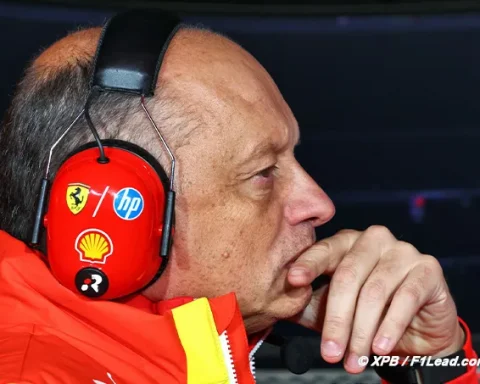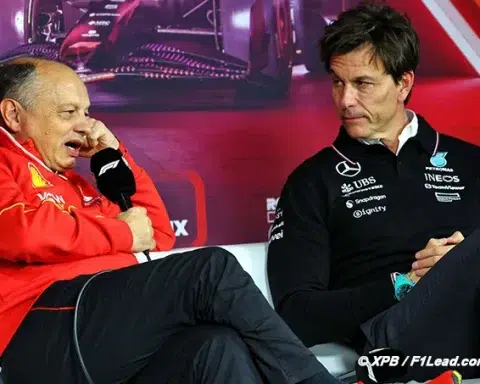The FIA defends fairness as nine F1 teams strongly oppose Audi’s proposed budget bonus, intensifying debates over cost cap adjustments.
Regarding the now-essential cost cap rule in F1, Sauber, and by extension Audi, face a structural disadvantage: salaries in Switzerland are significantly higher than in the United Kingdom. Similarly, at Audi’s German base, salaries are also higher than, for example, in Italy.
As a result, for the same budget, Sauber/Audi can afford to employ fewer staff—almost 25 to 30% fewer. It’s akin to fighting with one hand tied behind their back.
However, two positive developments are on the horizon for Sauber/Audi. First, the budget cap will increase for all teams in 2026, rising from $135 million to $215 million, excluding the growing number of reductions and exceptions.
More importantly, the FIA will place greater emphasis on salary variations across countries to minimize significant competitive distortions.
The newly introduced “consideration factor” in the FIA’s financial regulations will be calculated as the annual average salary of an F1 team divided by the weighted average annual salary in the country where the team is based, according to independent economic data.
As a result, Sauber/Audi could benefit from a budget of approximately $250 million, compared to $215 million for other teams.
Mattia Binotto had already pointed out that without this adjustment, it would be impossible for Audi to be competitive upon its 2026 entry.
This change was agreed upon earlier this year—despite unanimous opposition from all F1 teams, except Audi, of course.
“Why should a team based in Switzerland receive an exemption? Everyone chooses where to set up their team,” remarked Ayao Komatsu, the Haas F1 team principal (whose team operates between the UK, Italy, and the USA).
“Between London, Oxford, and the north of England, there’s a price difference. Where do you stop? Where do you draw the line? If you look at these aspects, you have to consider all advantages.”
“Additionally, for people living in Switzerland, the reasoning might differ. I remember, a long time ago, I tried to recruit someone from Sauber who loved skiing and the mountains, and he didn’t want to move to England.
“A lot of factors come into play. I think it’s very dangerous to focus on a single aspect and say, ‘OK, it’s more expensive here.’ You could just as easily look at the price of beer or something like that and say, ‘OK, it’s pricier, so you should get an exemption.’
“You are free to set up where you want.”
“The more detail you go into, the harder it is to cover everything, and that creates another problem.”
“I don’t know if ‘interesting’ is the right word, but in the F1 Commission meeting, apart from Sauber, strangely, everyone else was against it.”
For Ayao Komatsu, the FIA risks opening Pandora’s box and creating a host of ultra-complex checks if this logic is pursued further.
“So, I don’t understand why the FIA is pushing so hard for this. Again, you have to ask: what about the guys in Italy, like Ferrari and Red Bull, with facilities in Italy, or even us, with operations half-Italian, half-British… where do you stop?
“An engineer moving from the UK to Italy enjoys significant financial advantages there. Is that offset? Of course not. So where does it end?
“Unless you examine every dimension, it’s very difficult to make this completely fair. Can you look at every dimension? I don’t think so.
“That’s why I think this is very dangerous, honestly.”
Finally, when asked why the measure was adopted despite 90% of teams opposing it, Komatsu expressed clear bitterness.
“You said it yourself, didn’t you?”
The FIA responds to the other nine teams.
Ayao Komatsu’s remarks are, of course, somewhat disingenuous—it’s natural that no team likes to see its competitors strengthened. And Sauber happens to be a direct rival of Haas F1.
The FIA, however, is tasked with ensuring fairness in the sport, as Nikolas Tombazis, the FIA’s single-seater director, reminded earlier this year.
“Well, first of all, I’d say that in a democracy with nine wolves and one sheep, I think you can guess who gets eaten by the wolves.”
“So, while we certainly want consensus, democracy, and participation, it is our responsibility to strive for fairness. We’ll have opportunities every five or six years to make adjustments aimed at equity, especially where the competitive framework in F1 makes it difficult to achieve the majorities required among teams to support change.”
“It became clear to us that salaries in some countries are significantly higher, and the cost of living is substantially greater in certain places. I see it myself—I live in Geneva. When I go to the supermarket, I notice it.”
“We realized that under an approximately equal budget cap, a team based in a high-cost country like Switzerland would have around 30% or even 40% fewer staff working on the car, which we found fundamentally unfair.”
“We therefore decided to take regulatory measures, as the alternative would ultimately mean that such teams could no longer operate. A team like Sauber would have to close or relocate to another country, which we believe is not the right way for a world championship to function.”
Addressing accusations of bias, such as those implied by Ayao Komatsu, Tombazis clarified that the FIA would rely on independent data that is widely accepted within the economic community.
“That’s why there is an adjustment in the financial regulations for 2026, which will essentially account for salaries within the budget cap using factors determined by OECD [Organisation for Economic Co-operation and Development] data—these are not FIA figures, to be clear; they are publicly available data.”
“Now, I can add that since we already have financial regulations in place and receive data from the teams, we know that these OECD figures align closely with the salary disparities that exist even within the F1 context among engineers and team staff.”
“So, it’s not just OECD data. We have irrefutable evidence based on what teams pay their aerodynamicists, designers, or workshop staff, and all of it points in the same direction.”
“Therefore, I believe this regulation is entirely fair. I’ll also say that we plan to refine it further; we intend to make it a bit more transparent as well, so that teams concerned about potential unfairness can be reassured.”
“I think if you looked at the data, I don’t think anyone would doubt the fairness of this regulation.”
Ultimately, this is a measure of fairness introduced by the FIA. It’s no surprise that the ‘nine wolves’ would want to devour the Audi ‘sheep,’ but in this case, the FIA is playing the role of shepherd—a role it is, for once, fulfilling quite satisfactorily.
- Discover More>Alonso Warns of Las Vegas Danger: Points at Stake
- Follow us on >Facebook and >Twitter for F1 updates.
FIA Maintains Firm Stance Amid Audi Bonus Dispute FIA Maintains Firm Stance Amid Audi Bonus Dispute










